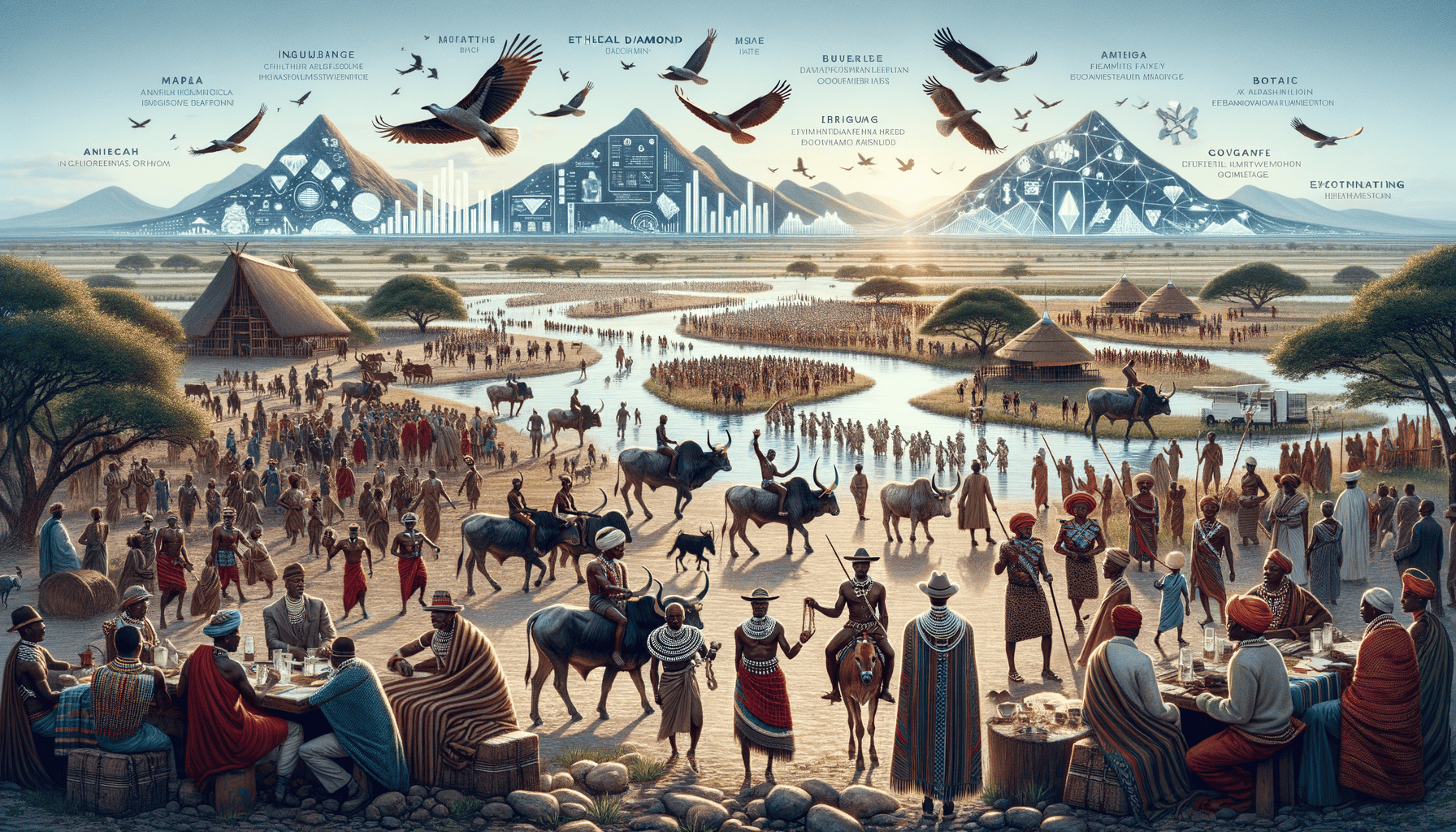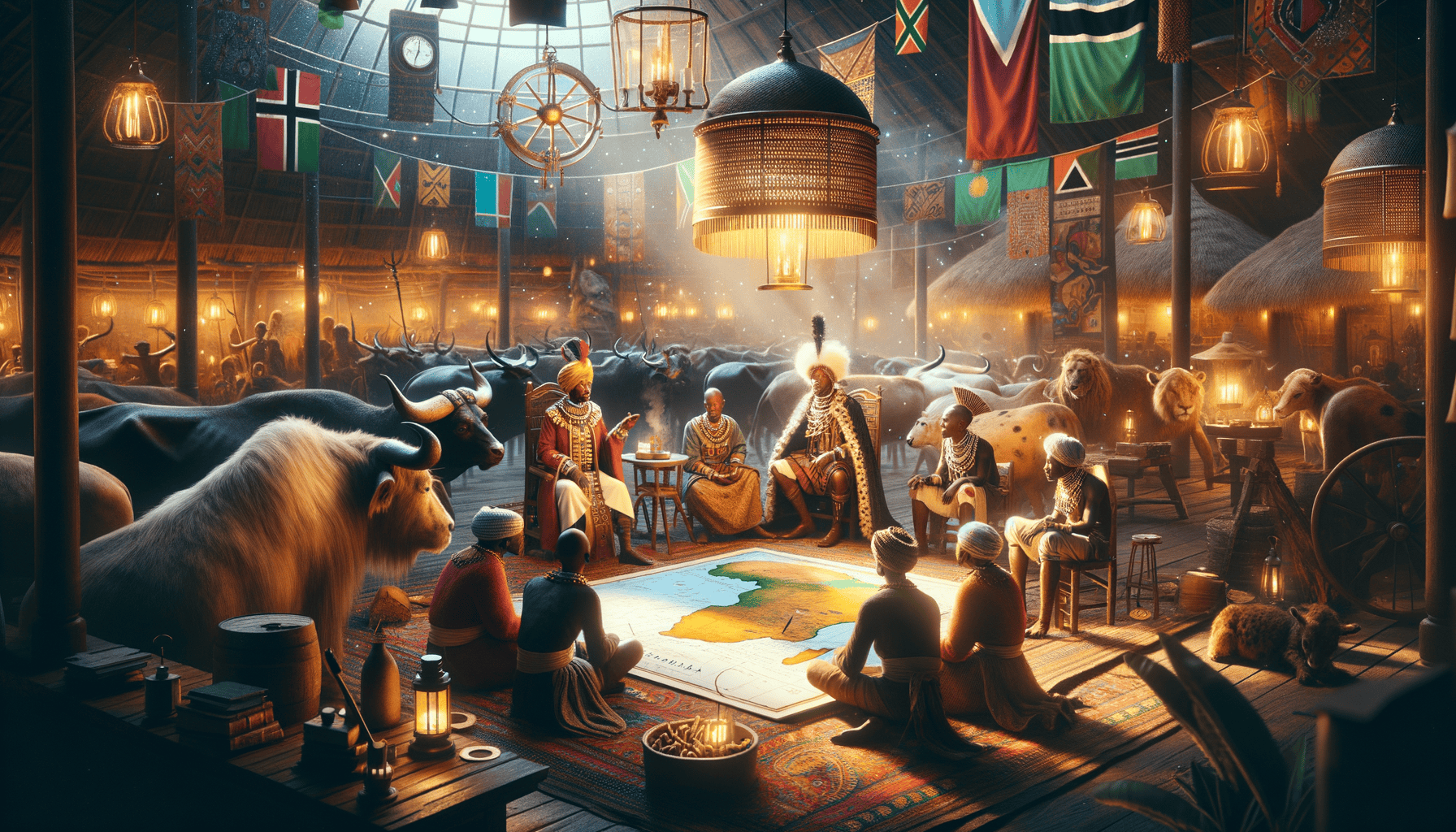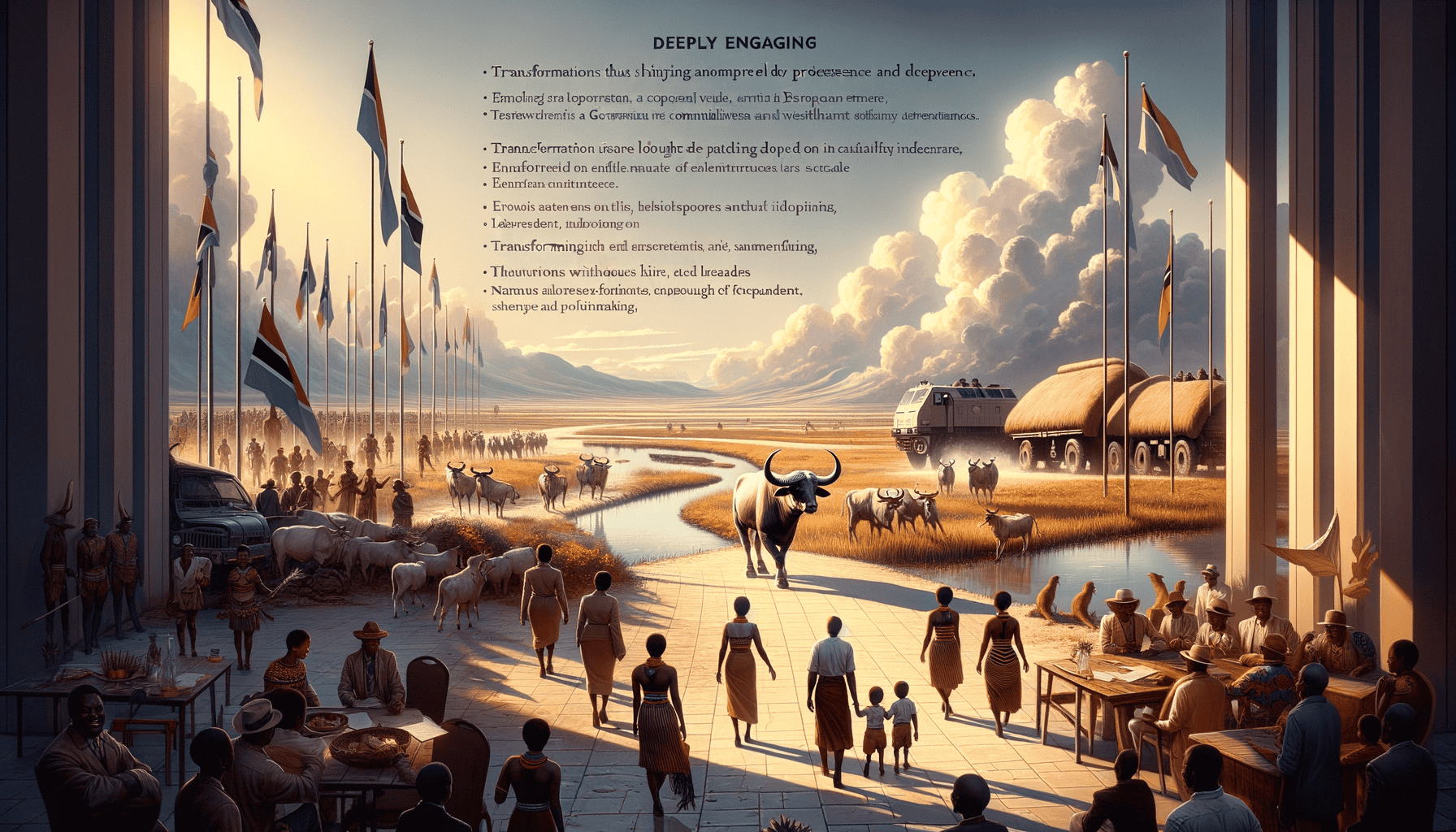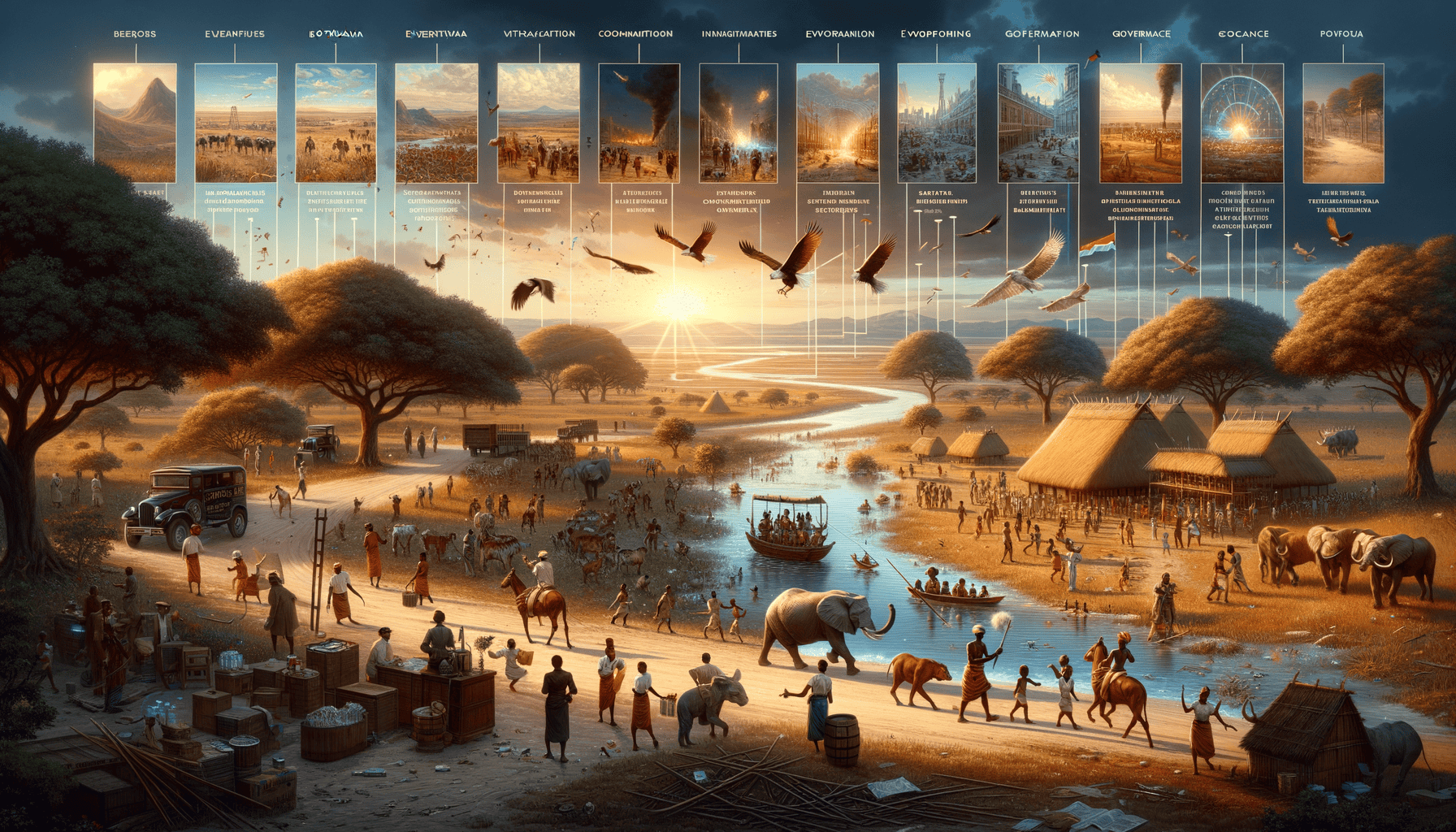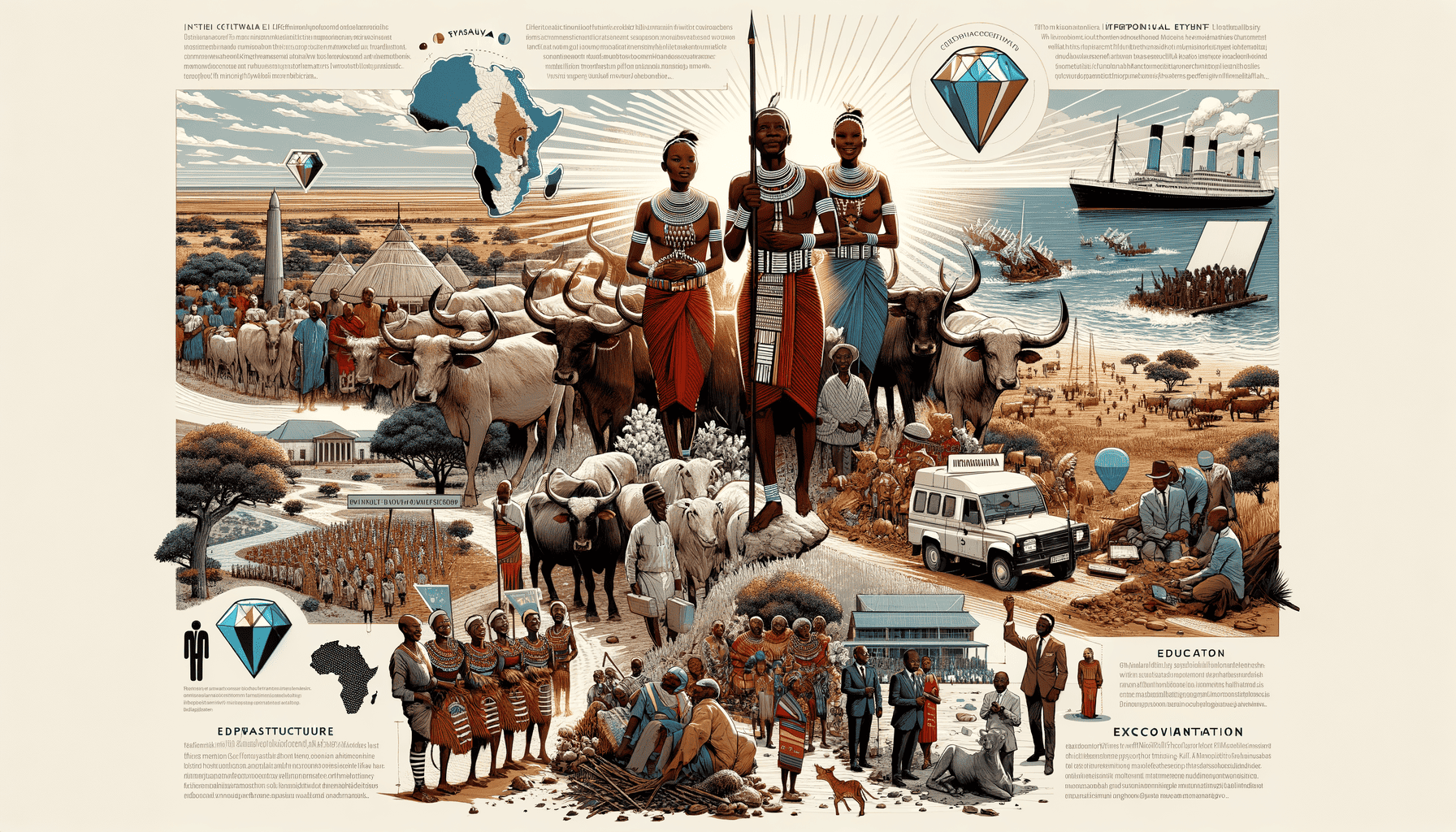The Land of the Tswana
Long ago, in a beautiful land called Botswana, the Tswana people lived in harmony with nature. Their home was special – imagine a place where golden grasslands stretched as far as you could see, with tall trees providing shade from the warm African sun.
"Dumela! Welcome to our village!" said Kgosi Mosadi, a wise village chief, as she greeted visitors. Her bright smile matched the colorful patterns of her traditional dress. The word 'Dumela' means 'hello' in Setswana, the language of the Tswana people.
Every morning, the village would come alive with activity. Children helped their parents take care of the cattle, which were very important to the Tswana people. Having lots of cattle meant you could help your community and was a sign of being wealthy.
"Our cattle are like our friends," explained Thabo, a young boy who loved helping his father in the fields. "We get milk from them, and they help us plow our land."
The village worked as one big family. Everyone had a job to do:
- The elders taught stories and wisdom to the young
- Farmers grew sorghum and maize in the fields
- Herders watched over the precious cattle
- Artists made beautiful pottery and baskets
- Hunters brought food for the community
Life in the Village
When the sun began to set, families would gather around fires to share stories. The storytellers would tell tales about brave chiefs, clever animals, and how the Tswana people came to live in this beautiful land.
"Listen, my children," Grandmother Dineo would say, her eyes twinkling in the firelight. "Our land is special because we take care of each other. Every person in our village is important, from the youngest baby to the oldest grandmother."
The kgosi (that's what they called their chief) made sure everyone in the village was treated fairly. They would sit under a large tree, listening to people's problems and helping them find solutions. This tree was called the kgotla, and it was where important decisions were made.
Life wasn't always easy in the grasslands. Sometimes the rains didn't come, and the crops wouldn't grow well. But the Tswana people were clever and strong. They learned how to save food for hard times and share with those who needed help.
Young Thabo loved learning about the plants and animals of his homeland. "Look!" he would exclaim, pointing to tracks in the dirt. "A zebra passed by here!" The children learned to read the signs of nature, just as their parents and grandparents had done before them.
At night, the stars would shine brightly over the village. The elders taught the children how to use the stars to find their way home and when to plant their crops. The Tswana people understood that they were part of something bigger – a connection between the land, the animals, and each other.
As the village settled down to sleep, Kgosi Mosadi would often say, "Our strength is not in what we own, but in how we care for each other and our land. That is the way of the Tswana."
The peaceful sounds of night would fill the air – crickets chirping, distant cattle lowing, and the gentle whisper of the wind through the grass. Tomorrow would bring new adventures and challenges, but the Tswana people would face them together, just as they always had.
Winds of Change
One sunny morning, something different happened in the peaceful village. Strange men with pale skin and unusual clothes arrived on horses. They were Europeans, and they came from very far away.
“Who are these people?” whispered little Thabo to his father. The whole village watched with curiosity as Kgosi Mosadi went to greet the newcomers.
Among these new visitors was a kind man named David Livingstone. He spoke differently, but he wanted to learn about the Tswana people. He brought gifts and medicines, and slowly, the villagers began to trust him.
“These visitors bring new ideas,” Kgosi Mosadi told her people. “We must be wise about what we learn from them and what we keep of our own ways.”
A Young Leader Rises
During this time of change, a special baby boy was born. His name was Seretse Khama. As he grew up, everyone could see he was different. He was clever and kind, just like his father who was a chief.
“One day,” the elders would say, “this boy will help lead our people through big changes.” They didn’t know how right they were!
Young Seretse learned both the old ways and the new. He went to school to study, but he never forgot the wisdom of his people. He learned to:
- Speak many languages
- Understand different cultures
- Lead with wisdom
- Keep peace between people
- Stand up for what’s right
Protecting Their Home
More and more Europeans came to Africa. Some wanted to take control of the land. But the Tswana chiefs were smart. They worked together to protect their people.
“We must be like the tree that bends in the strong wind but does not break,” said an elder to young Seretse. This meant being flexible but staying strong in who they were.
The British wanted to make Botswana their protectorate. This meant they would help protect the land from others who might want to take it. The chiefs had to make a big decision.
“If we agree,” said one chief, “we must make sure our people’s ways are respected.” They worked hard to write down rules that would protect Tswana culture.
Growing Up in Changing Times
As Seretse grew into a young man, he saw how things were changing. Some changes were good – like new schools and medicines. Other changes were harder – like new laws and ways of doing things.
“We can learn new things,” Seretse would say, “but we must not forget who we are.” He believed the Tswana people could keep their special culture while also learning from others.
The village children still played their traditional games, but now they also went to school. Their parents still kept cattle, but now they also learned to trade with people from far away.
At night, around the fire, the stories changed too. Now they included tales of brave chiefs who talked with the British, and clever people who learned new skills while keeping their traditions alive.
The stars still shined bright over Botswana, watching as the Tswana people found their way through these changing times. They were becoming stronger, wiser, and ready for whatever tomorrow might bring.
Every evening, as the sun set over the African plains, the people would gather at the kgotla. There, old and young would talk about their hopes for the future. The winds of change were blowing, but the Tswana people stood strong like the ancient baobab trees of their land.
Dreams of Freedom
The sun rose over the Kalahari Desert, painting the sky in beautiful orange and pink colors. The year was 1950, and big changes were coming to Botswana.
Standing Strong Together
Seretse Khama stood before his people at the kgotla (meeting place). He was now grown up and had studied in faraway England. His voice was strong and clear as he spoke.
“My people,” he said, “it is time for us to shape our own future. We can build a country where all people are free and equal.”
Many people gathered to hear Seretse speak. They knew he was right. They wanted to make their own choices and run their own country.
Working Together for Change
People from all over Botswana started working together. They formed groups and had meetings. They made plans for a free country. Here’s what they wanted:
- To choose their own leaders
- To make their own laws
- To build their own schools
- To farm their own land
- To keep their own culture strong
“Look at the ants,” an elder said to the children. “When they work together, they can carry things much bigger than themselves. We must be like the ants.”
Building a New Nation
It wasn’t always easy. Some people worried about change. Others wondered if they were ready. But Seretse and other leaders kept working hard.
Everyone helped prepare for independence. Teachers taught children about their new country. Farmers shared food for celebrations. Artists made flags and banners.
“What will independence be like?” asked a young girl named Mpho.
“It will be like waking up to a bright new morning,” her grandmother answered. “We will be free to dream our own dreams.”
The Big Day Approaches
As the day of independence got closer, excitement filled the air. People practiced new songs about freedom. They learned about voting and democracy.
Seretse worked with others to write laws that would be fair to everyone. They wanted to make sure all people in Botswana would be treated equally.
“We are like a family,” Seretse told the people. “In our new nation, everyone will have a place.”
On September 30, 1966, something amazing happened. The British flag came down, and a new flag went up – the flag of Botswana! People cheered, danced, and sang.
That night, as stars twinkled above, people celebrated around bonfires. Old and young danced together. They told stories about the past and shared hopes for the future.
Little Mpho looked up at the stars. “Grandmother,” she said, “now we can be anything we want to be!”
Her grandmother smiled. “Yes, my child. And we will build this new nation together, step by step, day by day.”
The cool night air carried the sounds of celebration across the land. Botswana was ready to write its own story. A story of freedom, hope, and working together.
Sparkling Treasures
One sunny morning in 1967, something amazing happened in Botswana. A geologist named Manfred Marx was walking in the dry earth near Orapa. He found something sparkly in the ground. It was a diamond!
The Big Discovery
“Come quick!” Manfred called to his team. “Look what I found!” Everyone gathered around, their eyes wide with wonder.
President Seretse Khama had an important decision to make. What would Botswana do with all these diamonds? Many countries in Africa had found treasure, but it didn’t always help the people.
Making Smart Choices
“These diamonds belong to all of us,” President Khama told his people. “We will use them to build schools, hospitals, and roads for everyone.”
The government made a special plan:
- Save money for the future
- Build new schools
- Make better roads
- Help sick people
- Give jobs to many people
Growing Together
Soon, big changes came to Botswana. New roads connected villages that were far apart. Children could go to school in buildings made of brick instead of mud.
“Look, Mama!” said little Thabo, pointing at workers building a new clinic. “Our village is getting bigger!”
His mother smiled. “Yes, and soon you won’t have to walk so far to see a doctor when you’re sick.”
Keeping Things Fair
President Khama made sure everything was done fairly. He created special rules about using the diamond money. No one could steal it or waste it.
“We must be like the wise ant,” he told his advisors. “We save for tomorrow while we work today.”
Other countries started noticing Botswana. They were surprised to see how well the country used its diamond wealth. Many came to learn from Botswana’s example.
Building for Tomorrow
As years passed, more good things happened. New businesses opened. More people got jobs. Children could dream bigger dreams.
“What do you want to be when you grow up?” a teacher asked her class.
“I want to be a doctor!” said one child.
“I want to build bridges!” said another.
“I want to find more diamonds!” laughed a third.
The teacher smiled. Because of the diamonds and smart choices, these dreams could come true.
At night, under the stars, grandparents told their grandchildren the story. They talked about the day diamonds were found, and how it changed everything.
“But remember,” they would say, “it wasn’t just the diamonds that made us rich. It was using them wisely and sharing with everyone that made us strong.” ⭐
The story of Botswana’s diamonds showed the world something important: when treasure is found, it can help everyone if it’s used the right way.
Schools, Health, and Happy Hearts
The sun rose over a brand new school building in Gaborone. Little Naledi pressed her nose against the classroom window. “Everything smells like fresh paint!” she said with a big smile.
Learning for Everyone
“When I was your age,” Naledi’s grandmother told her, “we had class under a tree. Now look at your beautiful school!”
Teachers came from all over to help. Ms. Molefe, Naledi’s teacher, wrote on a clean blackboard: “Welcome to Your New School!”
Healing and Hope
Down the road, a shiny new hospital stood tall. Inside, Doctor Kgosi helped sick people get better.
“Remember when we had to walk three days to see a doctor?” one old man said to his friend.
“Yes! Now we have doctors right here in our village,” his friend replied with joy.
Growing Together
President Khama wanted everyone to have good things, not just some people. He made a special list of what Botswana needed:
- Clean water for all villages
- Good food for every family
- Safe homes for everyone
- Jobs for grown-ups
- Parks for children to play
“Look!” shouted little Thabo, pointing at workers digging a new well. “Clean water is coming to our village!”
New Ways to Vote
Botswana did something special. They let everyone help choose their leaders. People would line up to vote, proud to have a say in their country’s future.
“Why do we vote, Papa?” asked Naledi.
“Because in Botswana, everyone’s voice matters,” her father answered. “Even yours will matter when you grow up!” ️
Working Together
People from different villages started working together more. They shared ideas and helped each other.
“We are like a big family,” said the village chief at a community meeting. “When one of us succeeds, we all succeed!”
New Dreams Growing
In the new schools, children learned about computers and science. They dreamed about becoming doctors, teachers, and leaders.
“What will you be?” Ms. Molefe asked her class.
“I want to build robots!” said one boy.
“I want to help sick animals!” said another.
“I want to be president!” Naledi declared, making everyone laugh and clap.
Looking Forward
Every evening, as the sun set over Botswana, people gathered to share stories. They talked about how things were getting better.
“Our country is like a young tree,” Grandmother would say. “Every day it grows stronger and taller.”
The children would look up at the stars and wonder what new amazing things tomorrow would bring to their beloved Botswana.
All across the country, from busy cities to quiet villages, people worked hard and worked together. They were building something special – a country where everyone could grow and be happy.
Friends Around the World
The morning sun sparkled on Botswana’s new buildings in Gaborone. People from all over the world came to visit and learn from this amazing country.
Making New Friends
“Look, Mama!” little Kgosi pointed at a group of visitors. “They came all the way from America to see us!”
His mother smiled. “Yes, my son. People want to learn how Botswana became such a special place.”
Keeping Old Ways Strong
Even with all the new things, Botswana kept its special traditions alive. At the cultural festival, dancers moved to ancient rhythms while wearing bright costumes.
“These dances tell our stories,” Grandmother explained to the visitors. “They help us remember who we are.”
Taking Care of Nature
In the Okavango Delta, rangers watched over elephants and lions. They made sure these amazing animals stayed safe.
“We protect our animals,” said Ranger Tau. “They are part of our family too!”
Growing Better and Stronger
The country faced some big challenges:
- Making sure everyone had good jobs
- Keeping the air and water clean
- Taking care of sick people
- Teaching new skills to workers
- Growing food for everyone
But the people of Botswana worked together to solve these problems. They never gave up!
Dreams Coming True
Remember little Naledi who wanted to be president? She grew up to be a doctor instead!
“I help people every day,” she said. “Just like my country helped me grow strong.”
Looking to Tomorrow
As the sun set over Gaborone, new buildings sparkled like diamonds. Young children played in safe parks while their parents worked in modern offices.
“What makes Botswana special?” a visitor asked little Kgosi.
“We care about each other,” he answered with a bright smile. “And we work together to make things better!” ❤️
The Story Lives On
Today, Botswana stands tall and proud. From a poor country with few schools, it grew into a place where dreams come true.
Every evening, under the African stars, grandparents tell their grandchildren the story of Botswana. They tell how their country grew from a small seed into a mighty tree that gives shade to all.
And so, the story of Botswana continues to grow, like the mighty baobab tree, reaching higher and higher into the bright African sky. Each new day brings new dreams, new hopes, and new chances to make their beautiful country even better.


